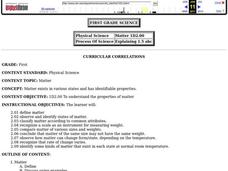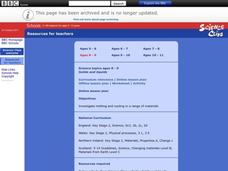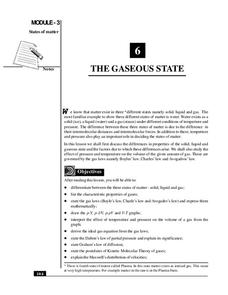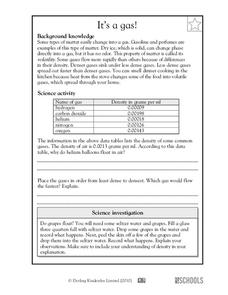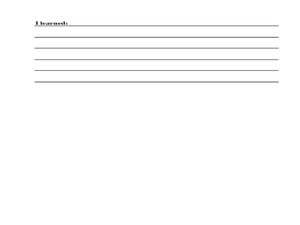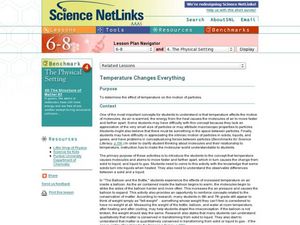Curated OER
States of Matter
In this states of matter worksheet, students read a 2 page article on the 5 states of matter, answer statements with multiple choice answers, fill in 4 fill in the blank statements and 3 true or false statements about the 5 states of...
Curated OER
Matter
First graders study and define matter. They observe and identify states of matter along with common attributes and study how matter can change form or change its state depending on temperature.
Curated OER
What Is the Matter with Water?
Second graders observe matter in all 3 states : liquid, solid and gas, in an ice cream soda. In teams, they are given ice and teams compete to be the first to melt their ice. Winner gets the ice cream soda. They draw examples of 3 states...
Curated OER
Science-Introduction to the Unit on Matter
First graders gain knowledge about solids, liquids and gases by taking a look at the things around them. They have to classify certain picture cards based on which category they feel the picture falls under. As a whole, the class...
Curated OER
Brain POP - States of Matter
For this states of matter worksheet, learners visit the website http://www.brainpop.com/science/matter and watch a movie to complete 7 fill in the blank questions, 5 matching questions, and an 18 clue crossword.
Curated OER
State of Matter - Atoms
Students examine and discuss how atoms change from solid to liquid to gas. They inflate a balloon by melting ice that converts to steam, and discuss the results.
Curated OER
Solids and Liquids
Students investigate what happens to solids and liquids when they change from one form to another. In this states of matter lesson, students work in groups on a virtual experiment that requires them to collect data regarding the melting...
Curated OER
Instructional Lesson Plan: States of Matter and their Properties
Learners identify the three states of matter and their properties. In this physical science instructional activity, students explore a website on the states of matter and complete a worksheet.
Curated OER
Phases of Matter
Eighth graders practice using correct vocabulary and apply content knowledge related to phases of matter when answering questions about situations or observations from everyday life.
Curated OER
A World Of Matter
First graders complete a variety of experiments with solids, liquids and gases. They read books about matter, identify the characteristics of solids, liquids and gases and the sort and classify a variety of matter. Students make...
National Institute of Open Schooling
The Gaseous State
Sixth in a series of 36, this lesson focuses on gases and their behavior in given situations. Learners review the states of matter and then focus on gases, specifically learning Boyle's, Charles's, Avogadro's Laws, Dalton's, and Graham's...
Curated OER
Who Wants to be a Millionaire? Changing State
A teacher with talent has created a fun set of review questions on the changing states of matter. Cycle through 15 questions, multiple choice answers, and a monetary reward for guessing correctly. Use this game show PowerPoint to help...
Curated OER
It's A Gas!
Fifth graders complete a worksheet which has them place a list of gases in order from the least to the most dense. The density in grams is given for each. There's a good paragraph which provides background knowledge about the volatility...
Curated OER
Dry Ice: Simply Sublime
A fascinating lesson on states of matter is here for your young scientists. Dry ice is used to challenge learners preconceived notions about how solids work. They discover all sorts of interesting facts about states of matter from...
Curated OER
Changing States of Matter - Making Ice Cream
Students make ice cream as a result of viewing changes of states of matter. In this matter lesson plan, students learn how heating and cooling can effect a state of matter to change.
Curated OER
States of Matter
By viewing this PowerPoint your students' understanding of molecular energy should increase. The properties and inter-particular forces are summarized. The logical progression of information is useful, but more data to demonstrate...
Curated OER
Waterproof Paper
Students explore matter through the concept of displacement. They perforrm an inquiry experiment with a glass, paper and a bucket to demonstrate that gases take up space.
Urbana School District
Fluids
In 1879, Sir William Crookes discovered the fourth state of matter, plasma. The presentation covers states of matter, phase changes, density, pressure Pascal's Principle, buoyant force, Archimedes' Principle, Bernoulli's Principle,...
American Chemical Society
Air, It's Really There
Love is in the air? Wrong — nitrogen, oxygen, and carbon dioxide are in the air. The final lesson in the series of five covers the impact of temperature on gases. Scholars view a demonstration of gas as a type of matter before performing...
Santa Monica College
The Density of Liquids and Solids
There are underwater rivers that flow on the ocean floor thanks to a difference in density. Scholars learn about the density in both liquids and solids in the second activity of an 11-part series. They then determine the density of...
American Chemical Society
Molecules Matter
Did you know that jumping spiders sometimes wear water droplets as hats? A seventh grade science lesson introduces the concept of what makes up water: tiny molecules that are attracted to each other. Starting with a...
Curated OER
Temperature Changes Everything
Middle school chemists visit interactive websites in order to discover what happens to molecular motion when heat is added to matter. They conduct an experiment that demonstrates the expansion of matter with the addition of heat. A lab...
Curated OER
Chemical Wonders
Students read about and discuss how chemical engineers use different states of matter to create substances. In this chemical engineering lesson plan, students also give examples of the 3 kinds of matter.
Curated OER
Matter, Matter, Everywhere!
Eighth graders make inquiry about the existence of matter. A definition of the word is needed before students can engage in various activities. The application of knowing about matter is done in the working of experiments.



